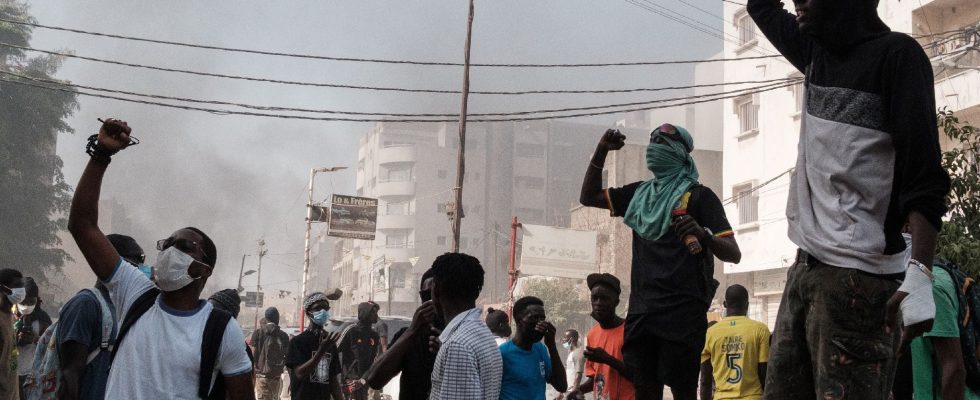With his mouth and nose hidden under a khaki scarf, Abdoulaye Diop tries to remain motionless in the face of the police spraying tear gas to disperse the crowd. With a gesture of his arm, he signals his comrades to return, but everyone has already turned on their heels towards the adjacent streets. Since the announcement of the postponement of the presidential election by President Macky Sall, confirmed by a law passed in parliament, all attempts at demonstrations have been systematically repressed and dozens of people arrested. “It is impossible to express our disagreement, we are dislodged in no time each time… Macky will not listen to the anger of the street”, deplores Abdoulaye Diop, convinced that the outcome of this political crisis lies elsewhere .
On Friday, opposition deputies filed an appeal before the Constitutional Council to cancel the law which postpones the election (initially scheduled for February 25) to December 15, 2024, and thereby extends the powers of Macky Sall. They denounce a “constitutional coup d’état”. By the admission of constitutionalist Babacar Guèye, the maneuver has little chance of succeeding, Macky Sall having already crossed too many “red lines”. However, this is the last resort for a return to normal. “As long as there is no response commensurate with the attack, he will continue to persist,” said the professor at Cheikh Anta Diop University in Dakar. And to continue: “We are in a great period of turbulence. All scenarios are possible, including, and perhaps above all, a risk of a coup d’état.”
Part of the population calls on the army
A little more than a week after the start of this political crisis which plunges the 18 million Senegalese into uncertainty, no analyst excludes that Senegalese democracy, renowned for its stability, will soon end up faltering. The regional context marked by military coups in recent years, in Niger, Mali, Guinea and Burkina Faso is on everyone’s minds. “Senegal is really not safe from a coup,” comments Adjaratou Wakha Aidara, executive director of the NGO Partners of Africa. Especially since in recent days, we have seen numerous calls from the population for a restoration of constitutional order by the army.” A sign that the Senegalese have confidence in their army to guarantee the national order, certainly, but also of immense dismay. “Today, there is a segment of the population who thinks that the army can be the last rampart to save it from an authoritarian regime,” continues the expert.
If the army intervenes, however, several specialists agree that their approach would have nothing to compare with the putsches perpetrated this summer in Niger and Gabon. “In the event of generalized disorder, the defense tool could take its responsibilities to restore order, but not in the same spirit as the juntas, which, elsewhere, gave the argument of the transition to ultimately keep power “, estimates Bruno Clément-Bollé, former director of defense security cooperation (DCSD) at the Quai d’Orsay. For his part, Paulin Maurice Toupane, researcher at the Institute for Security Studies in Dakar, considers a coup by the army “unlikely”, but according to him, the latter could “accompany” the political power.
On the continent and in the region, the Senegalese army is an exception. Since independence in 1960, she has always taken part in the life of the country, taking care to stay out of the political game. In 2023, asked by certain politicians to “take responsibility” after the deadly demonstrations caused by the arrest of the main opponent Ousmane Sonko, the army had expressly asked to be kept out of the political debate.
Very well trained, “the Senegalese army is a unique army in Africa, by its professionalism but also by its republican sense. This is why the image of its leaders is excellent at the United Nations”, notes General Bruno Clément-Bollé , who spent almost his entire career on the continent, and today advises certain governments on military matters. “It’s an army that respects the rules and complies with the laws,” he insists. Even in the face of an increasingly authoritarian and obstinate president?
.
